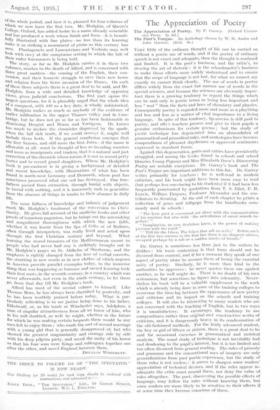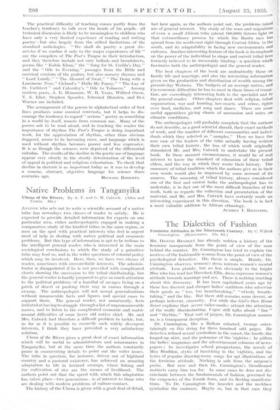The Appreciation of Poetry
The Poet's Tongue. An Anthology chosen by W. H. Auden and John Garrett. (Bell. es.) VEIti, little of the ordinary thought of life can be carried on
without a poetic use of words, and if the poetry of ordinary speech is not exact and adequate, then the thought is confused and limited. It is the poet's business, and the critic's, to develop the art of rhetoric : it is the schoolmaster's business to make those efforts more widely understood and to ensure that the scope of language is not lost, for what we cannot say exactly we cannot think clearly. The use of words in poetry differs widely from the exact but narrow use of words in the special sciences, and because the sciences arc obviously impor- tant there is a growing tendency to regard the things which can be said only in poetic terms as being less important and less " real " than the facts and laws of chemistry and physics.
Consequently poetry is regarded more and more as a plaything and less and less as a matter 'of vital importance to a living language. In spite of this tendency, lip-service is still paid to poetry, and often teachers possess and give to their pupils a genuine enthusiasm for certain poems ; but the study of pus tic technique has degenerated into an abracadabra of grammatical and prosodical rules, and anthologies have become compendiums of pleasant daydreams or approved sentiments expressed in standard forms. Against, this degeneration, poets and critics have persistently struggled, and among the books found in schools and school libraries Young Pegasus and Miss Elizabeth Drew's Discovering Poetry are notable exceptions. Dr. Gurrey's book and The Poet's Tongue are important additions to this list. Dr. Gurrey writes primarily for teachers : lie is well-read in modern criticism, and his book might have been more easy to read (but perhaps less convincing to his students) if it had been less frequently punctuated by quotations from T. S. Eliot, F. R. Leavis, William Empson, Professor Alexander and the con- tributors to 'Scrutiny. At the end of each chapter he prints a collection of gems and lollipops from the handbooks com- monly used in schools : " The lyric poet, is concerned not alone with the communication of his emotion but also with the articulation of sweet sounds to- gether.' "
Imagination, as you doubtless know', is the power of makins,
pictures with the mind."
" Toll 161, the Ifave, The bilve that are no India.' Before each
of the first two stresses in the first line there is an eloquent silence, occupied perhaps by a sob or a sudden intake of breath."
Dr. Gurrey is sometimes less than just to the writers he dislikes : his main contention is that form should not be divorced from content, and if for a moment they speak of one aspect of poetry alone he accuses them of losing the essential unity of poetry. Similarly, he is more than kind to the authorities he approves : lie never quotes them one against another, as lie well might do. There is no doubt of his own lapses into solemnity. Never- keriousness, but sometimes he
theless his book will be a valuable supplement to the work which is already being done in some of the training colleges to overcome the time-lag betieeen the appearance of new poetry and criticism and its impact on the schools and training colleges. It will also be interesting to many readers who are not concerned With the teaching of English, but in two ways it is unsatisfactory. It encourages the tendency to use compendiums rather than original and constructive works of criticism, and it is dangerously heavy in its condemnation of the old-fashioned methods. For the fairly advanced student, the boy or girl of fifteen or sixteen, there is a great deal to be said for occasional exercises in grammatical and metrical analysis. The usual study of technique is not inevitably bad and deadening to the pupil's interest, but it is too limited and too often divorced from general reading. The rules of prosody and grammar and the conventional uses of imagery are only generalizations from past poetic experience, but the study of those rules is not useless : it serves to sharpen some readers' appreciation of technical devices, and if the rules appear in-
adequate the critic must amend them, not deny the value of rules altogether. The poet, discovering the possible effects of language, amay follow the rules without knowing them, but some readers are more likely to be sensitive to their effects if at some thhe they- become -conscious of them, • . The practical difficulty of teaching comes • partly from the teacher's tendency to talk over the heads of his pupils—all technical discussion is likely to be meaningless to children who have only a very limited experience of reading and writing poetry—but also largely from the stilted limitations of the standard anthologies. " We shall do poetry a great dis- service if we confine it only to the major experiences of life " say the compilers of The Poet's Tongue in their introduction, and they therefore include not only ballads and broadsheets, poems like " Kubla Khan," the " Song for St. Cecilia's Day," and the " Ode to Evening," passages from the Bible and metrical versions of the psalms, but also nursery rhymes and Lord Lundy," " The Akoond of Swat," " The Dung with a Luminous Nose," Cleland's " Hallo My Fancy," " The Lay of St. Cuthbert and Calverley's " Ode to Tobacco." Among modern poets, A. E. Housman, W. B. Yeats, Wilfred Owen, T. S. Eliot, Stephen Spender, Edmund Blunden, and Rex Warner are included.
The arrangement of the poems in alphabetical order of first lines produces some comical contrasts, but it helps to dis- courage the tendency to regard " serious " poetry as something in a world by itself, remote from common use. Many of the poems ask to be read aloud, and in teaching the reader the importance of rhythm The Poet's Tongue is doing important work, for the appreciation of rhythm, other than obvious doggerel, seems to be beComing rarer, and language which is used without rhythm becomes poorer and less expressive. It is as though the sciences were deprived of the differential calculus. The results of the decline in the poetic use of language appear very clearly in the steady deterioration of the level of appeal in political and religious exhortation. To cheek that decline in rhetoric is as important today as it was to develop a concise, abstract, objective language for science three



































 Previous page
Previous page